March 2, 2025 – Day 14 of the 100-Day Dharma Talk, Meditation, Dharma Practitioners’ Assembly
Hello. Today is the 14th day of the 100-Day Dharma Talk. Sunim guided meditation for the Sangha in the morning and participated online in the Jungto Practitioners’ Assembly in the afternoon.
After completing his morning practice and meditation, Sunim headed to the Jungto Social and Cultural Center at 10 AM. In the Dharma Hall on the third floor, about 320 people were sitting in the lotus position, ready for meditation.
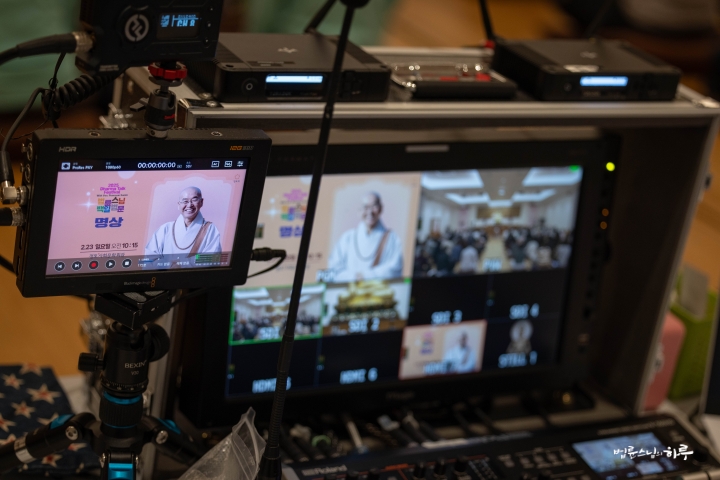
When the Sangha requested Dharma teaching with three bows, Sunim began guiding them on how to meditate.
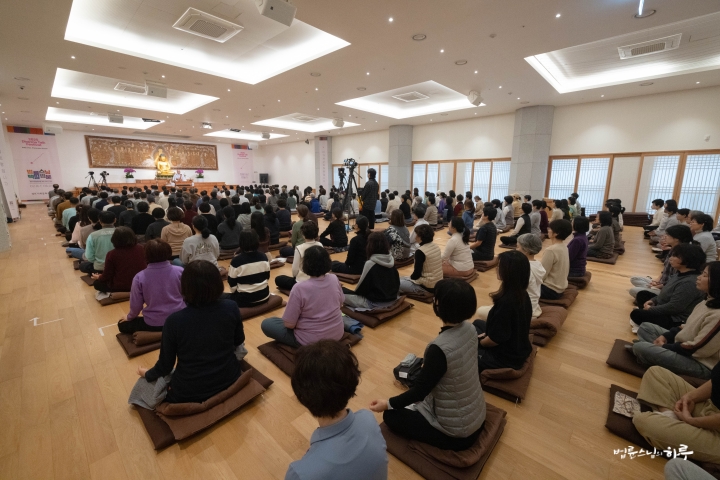
“Sit in the proper posture. Assume the lotus position, straighten your back, hold your head upright, face forward, gently close your eyes, and place your hands in front of you. If your arms are short, you may rest your hands on your knees. When the wooden clapper sounds, you should remain completely still until the next clap. If your body itches, simply be aware of the itching; if there’s pain, be aware of the pain; if you feel hot, be aware of the heat; if you’re uncomfortable, be aware of the discomfort. Just recognize ‘there is this sensation,’ without moving, stretching your legs, or forcing yourself to endure it. Simply be aware.
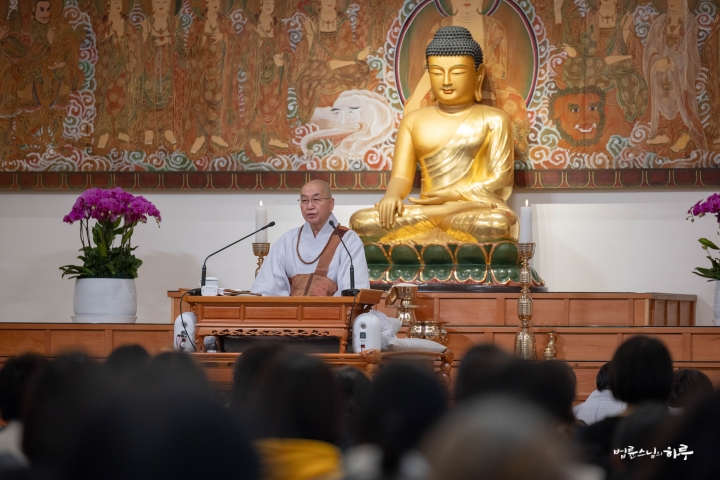
Be Aware of Your Inhalation and Exhalation
After assuming the proper posture, relax your body and mind. Then, focus your attention on the tip of your nostrils and be aware of your inhalation and exhalation. When you breathe in, be aware that you’re breathing in; when you breathe out, be aware that you’re breathing out. Don’t intentionally control your breathing; simply be aware of the natural breath as it occurs.”
As Sunim finished his guidance, the wooden clapper sounded, and meditation began.
“Tak, tak, tak!”
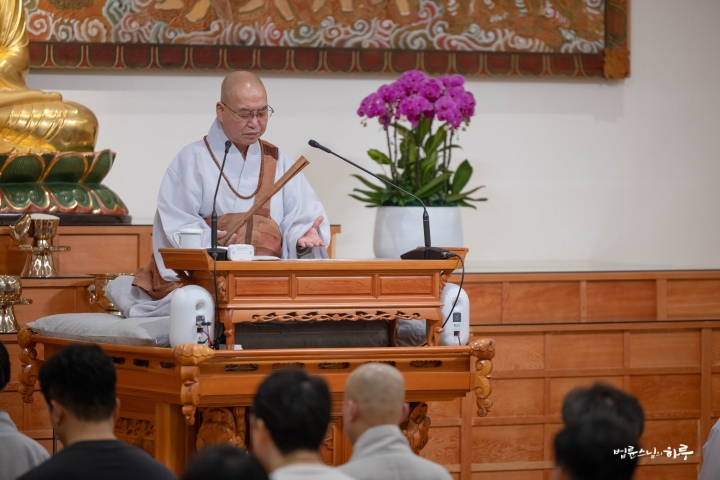
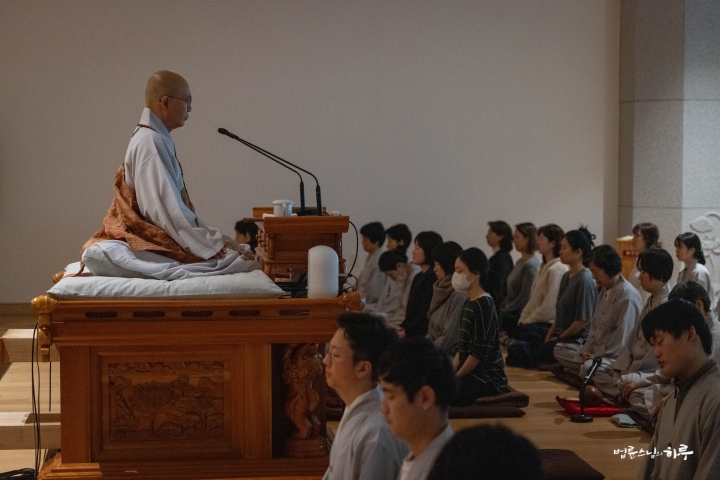
After 30 minutes of meditation, the wooden clapper sounded again.
“Slowly stretch your legs. Then quietly rise from your seat and follow the markings on the floor, walking slowly to the right. When you stand up, be aware that you are standing up. When you walk, be aware that you are walking. Be mindful of your body’s movements and posture.”
Sunim led a 10-minute walking meditation. During this practice, everyone focused on being mindful of posture and movement.
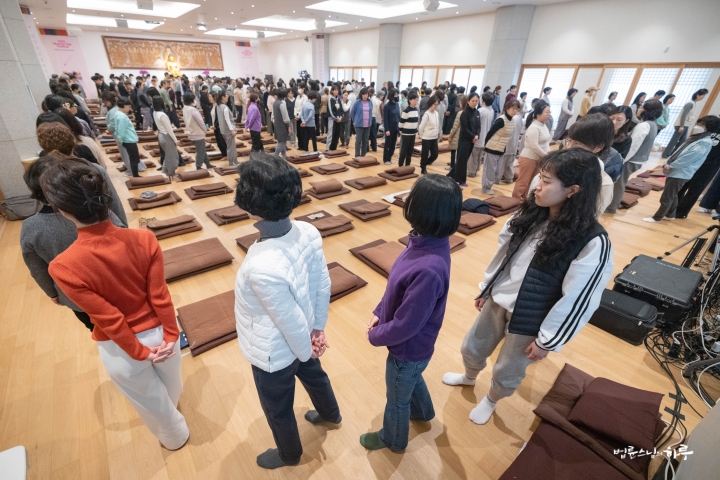
Throughout the session, Sunim provided detailed guidance. Following his instructions, everyone returned to their seats to continue meditation.
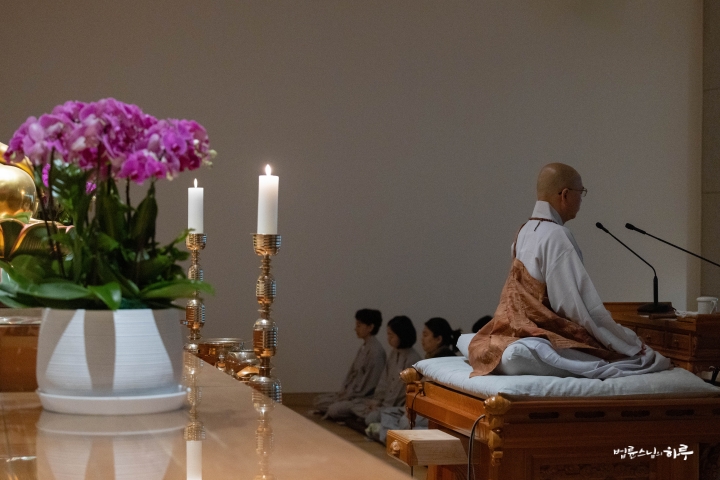
“When breath comes in, be aware that it is coming in. When breath goes out, be aware that it is going out. If your breathing is rapid, be aware that it is rapid. If it is gentle, be aware that it is gentle. If your breath comes in long, be aware that it is long. If it comes in short, be aware that it is short. Whatever sounds arise outside, whatever sensations arise in your body, whatever thoughts arise in your mind, do not pay attention to them. Focus only on the tip of your nostrils and be mindful of your inhalation and exhalation. Do not try too hard to do well, do not be pleased when it works, do not be disappointed or give up when it doesn’t work. Just be mindful of your breath. Stay relaxed while maintaining awareness. If you lose focus, simply begin again.”
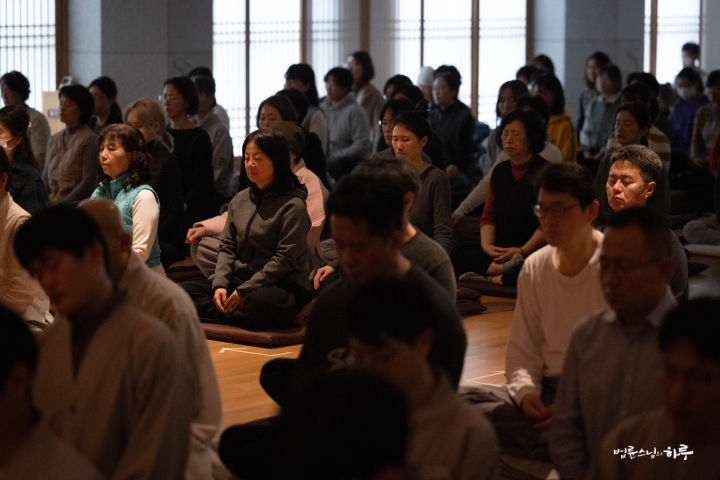
Another 30-minute meditation session followed.
“Tak, tak, tak!”
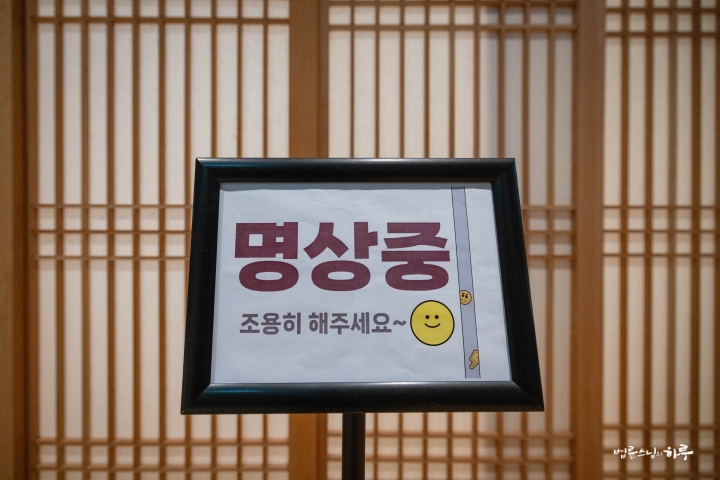
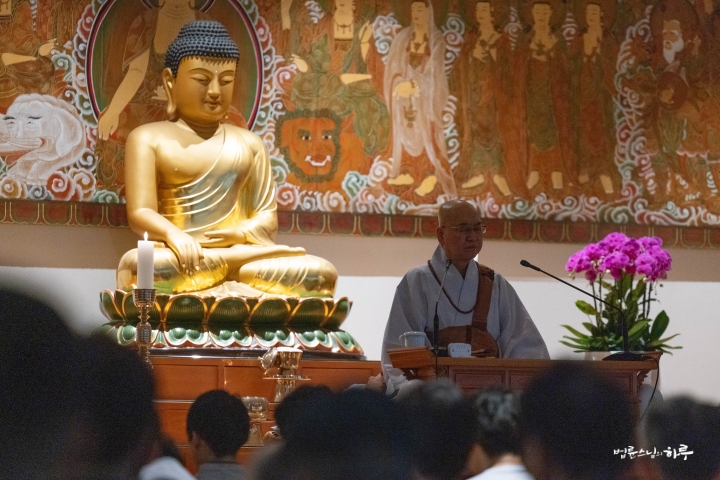
Today’s session concluded after three 30-minute meditation periods.
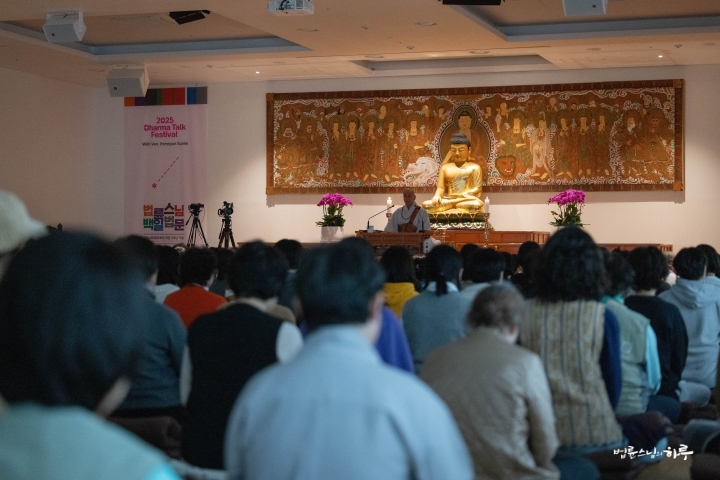
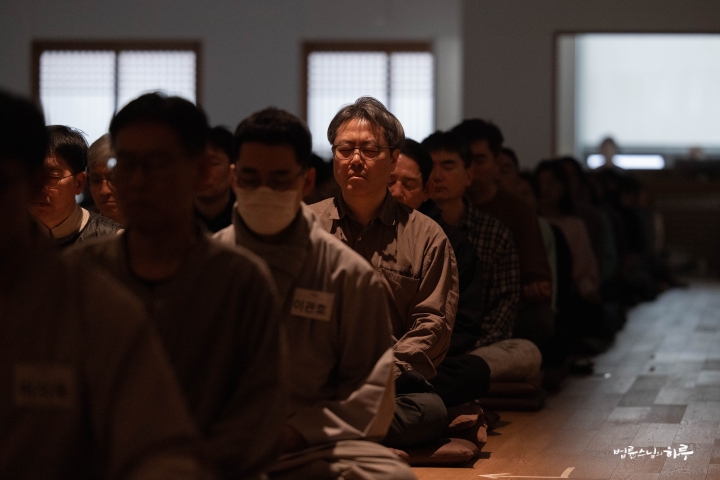
While the participants gathered in groups to share their thoughts and experiences, Sunim left the third-floor Dharma hall and headed to the broadcasting room in the Jungto Center.
After lunch, at 2 PM, Sunim participated online in the Leading Members’ Assembly. This was a gathering where all leading members came together in an online space to share and propose ideas for Jungto Society’s overall activities. This was the fifth Leading Members’ Assembly since the beginning of the Second 10,000-Day Practice.
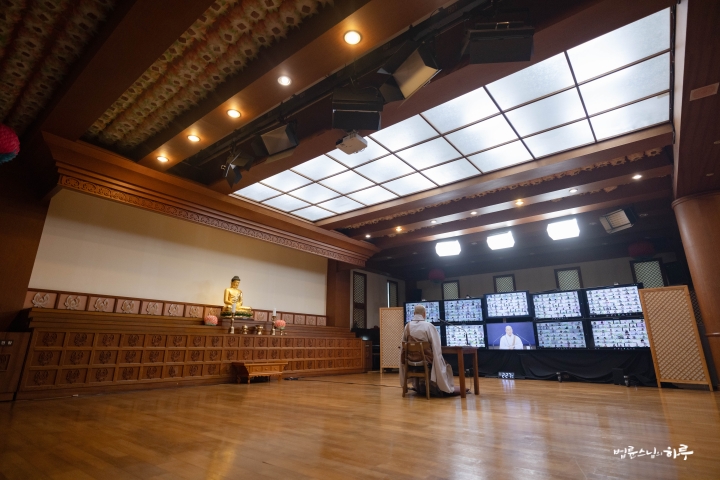
The Leading Members’ Assembly began with approximately 2,100 leading members from both domestic and international locations joining the video conference. After the assembly members paid their respects to Sunim with three bows and requested his teaching, Sunim delivered the opening Dharma talk. He emphasized how to overcome the current crisis amid the impeachment situation and national division.
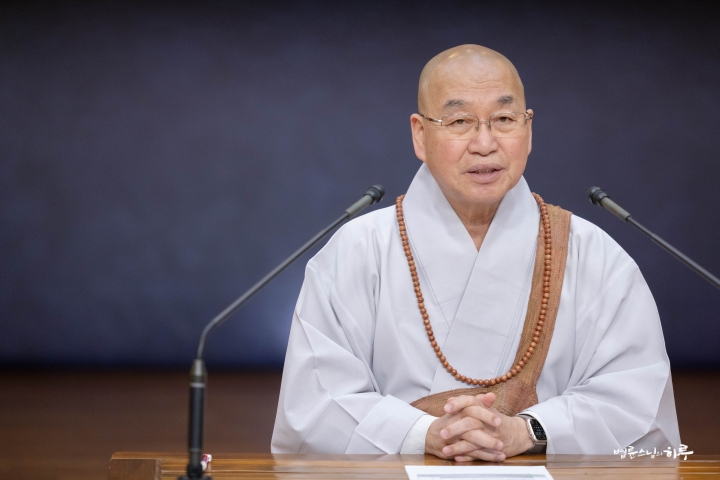
How Should We Overcome the Crisis of Impeachment and National Division?
“Currently, South Korea is in an unstable state amid political turmoil. After the president declared martial law and the National Assembly passed a resolution to lift it, an impeachment motion was passed, and now the Constitutional Court is in the process of deliberation. As the impeachment ruling approaches, the controversy over support and opposition has intensified, leading to a complete division of national opinion. Additionally, with the election of President Trump in the United States, the international order as we have known it has changed, throwing the entire world into confusion. The summit between the United States and Ukraine broke down after a public exchange of heated words—something that could never happen in a normal summit. We can expect such chaotic scenes in the international order to occur frequently in the future.
South Korea Surrounded by Factors of Instability
South Korea is currently facing various factors of instability, including national division, economic crisis, and the restructuring of the world order. Nevertheless, the current situation has improved compared to last year because the risk of war was higher than ever before. If a war were to break out, the damage would be beyond our imagination. Paradoxically, the risk of war has been somewhat mitigated by the very people who have caused us the most confusion. The declaration of martial law by President Yoon Suk-yeol and the election of President Trump in the United States have actually had the effect of reducing the risk of war. This result gives us a hint about where the tension that has been building toward a war crisis over the past few years originated from.
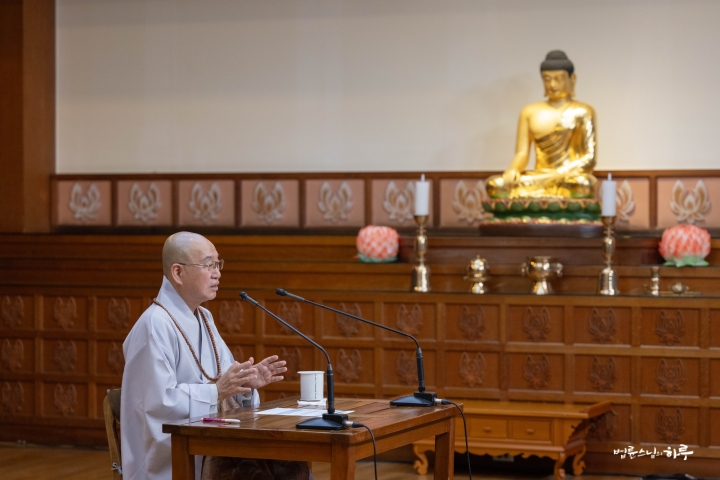
Jungto Society expended considerable effort in holding the June 13 Mass Dharma Assembly to prevent war. If the risk of war had escalated further, Jungto Society would have had to suspend all other activities by now and devote all its energy to preventing war. Fortunately, the risk of war has subsided, which is a relief. However, as with everything that has consequences, while the reduced risk of war is positive, we can expect to pay a significant economic price in the future due to President Trump’s tariff barriers.
Additionally, had President Yoon Seok-yeol’s martial law not been thwarted, we cannot imagine how much blood the citizens would have had to shed. It is extremely fortunate that martial law was prevented, but on the other hand, the impeachment situation, the resulting national division, and the confusion from a new presidential election continue. When focusing on these chaotic aspects, it may seem negative, but there are always positive outcomes that make enduring such confusion worthwhile. Therefore, we need not view the situation too pessimistically.
How to Ease National Division and Respond Actively to the Future
What concerns me more than the current confusion is that whether the president is impeached or not, and regardless of who is elected as the new president, this polarized conflict seems unlikely to end. No matter what the outcome, the conflict is bound to continue.
Being in Korea during the 100-Day Dharma Talk period, I hear many concerns about how to wisely navigate our country’s political situation. Not just one or two, but many people have approached me to express their worries. The majority opinion is that regardless of which president is elected, we must prevent the repetition of similar situations. With international affairs in turmoil and domestic politics so unstable, it will be difficult for South Korea to respond actively to new changes in the future. Particularly in this time when countries are investing heavily in artificial intelligence and robotics, China, once a latecomer, is now surpassing us. While domestic political leaders are preoccupied with seizing power by dwelling on past issues, our country’s future becomes increasingly uncertain. Therefore, we should not blindly follow the political situation but instead regain our senses and work toward calming the chaos.
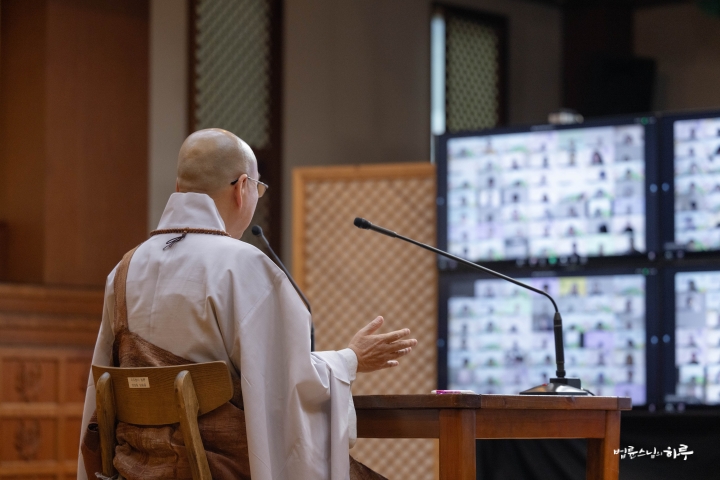
Why We Must Distinguish Between Matters of Faith and Matters of Fact
In South Korea, everyone has the freedom of thought, freedom of belief, and freedom to hold political convictions. Everyone also has the right to know the facts. However, these rights come with responsibilities. Recently, there has been intense debate about election fraud. This is not a matter of faith, like whether God exists or not. It is an objective issue where facts can be verified. Yet some people are acting with conviction almost like a religious belief despite no evidence having emerged. You may have doubts or you may believe. However, as a member of Jungto Society, you should always maintain an attitude of verifying the truth according to Buddha’s teachings. You should not claim uncertain things as if they were facts. On issues where facts can be verified, such as election fraud, you can have doubts until the facts are confirmed, but you must remain cautious.
For example, the President’s violation of martial law by dispatching troops to the National Election Commission and the National Assembly is clearly illegal. Thinking that “this might be justified because the National Assembly keeps interfering” is an emotional response far from the truth. One might have different opinions about whether violating the law constitutes a serious enough crime to warrant the President’s resignation. However, the notion that no law was violated is simply not factual. You can think impeachment should happen, or you can think it shouldn’t. But opposing impeachment by claiming “there was no wrongdoing” means turning a blind eye to verifiable truth. Freedom of faith, freedom of belief, freedom of thought, and matters of truth are separate issues. Today, many people make claims as if they were facts without verification, influenced by certain YouTubers’ instigation. You must be able to distinguish between matters of faith and matters of fact.
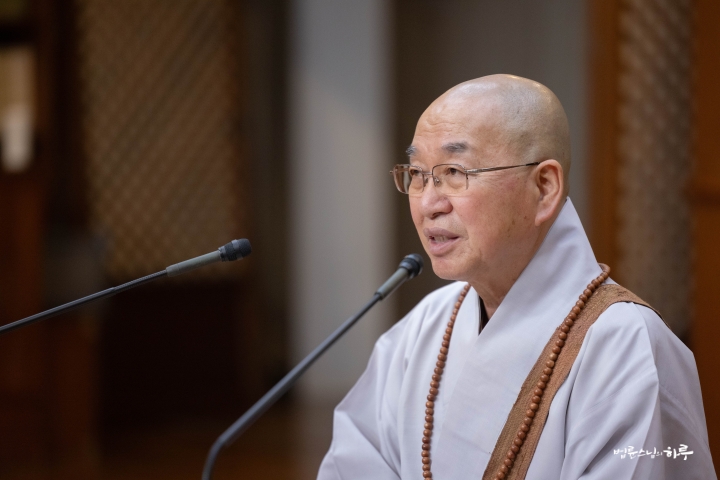
If We Embrace Others Rather Than Argue
While we live in South Korea valuing liberal democracy as our most important principle, we cannot resolve conflicts without considering North Korea’s position as a key party in Korean peninsula peace. Moreover, North Korean children and citizens are not the direct cause of these political conflicts. We must uphold universal human values toward those in need. To be considered a Jungto Society member, one should be willing to provide food to starving North Korean children and citizens, and medicine to those who are ill—this reflects basic universal human values. If one thinks, “Those people deserve to die. Why should we give them food?” it would be difficult to call such a person a practitioner. Of course, individual opinions are respected. However, from the Buddha’s teachings of the Middle Way (中道), dependent origination, and great merch and compassion, such thinking represents extremism rather than the Middle Way, and opposition between separate entities rather than dependent origination. Therefore, instead of arguing about these political situations, you should adopt an attitude of embracing those who differ from you.
We should always maintain an attitude of seeing the truth. However, what values one holds is a matter of personal freedom. Therefore, we need an inclusive attitude that acknowledges “they might think that way.” From this perspective, rather than viewing the current situation as only chaotic, it would be better to recognize its positive aspects while focusing energy on how to improve it. Instead of merely saying “Thank goodness we survived” after escaping the danger of war, if we adopt the perspective that ‘Now that I have survived, let me help those in difficulty,’ we will overcome these challenges well.”
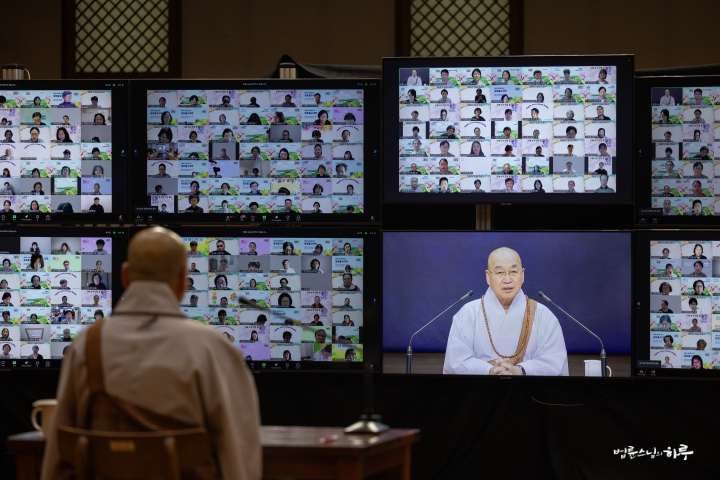
Sunim declared the opening and proceeded to the main session.
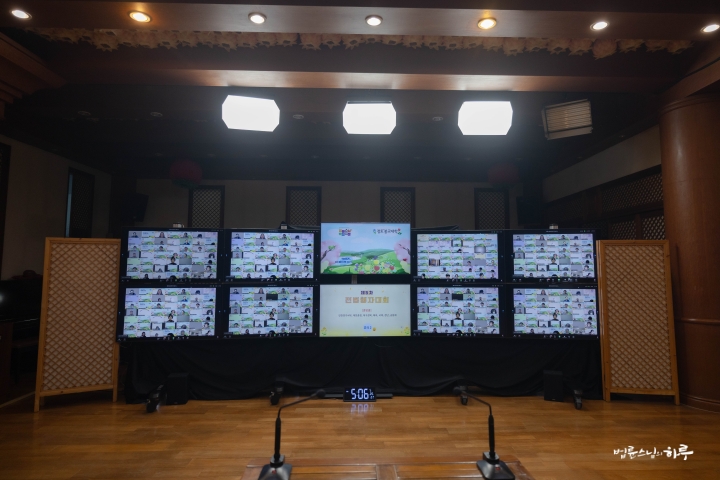
After delivering the opening Dharma talk, Sunim headed to The Peace Foundation. A visitor came, and Sunim offered advice on how to stabilize the chaotic state of national affairs.
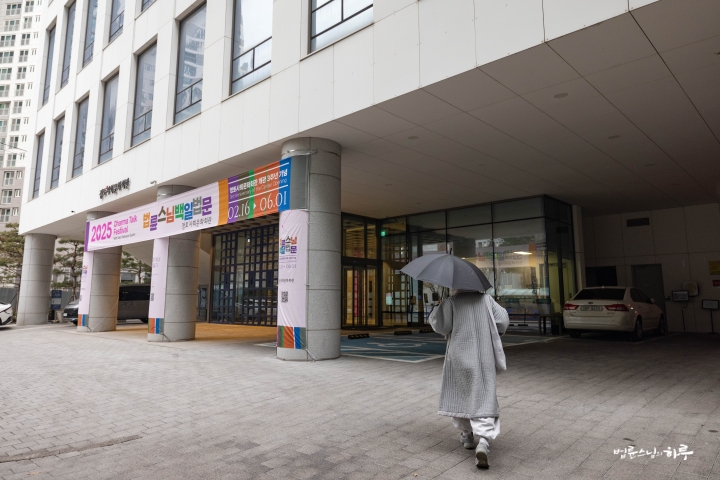
After 5 PM, Sunim moved to the broadcasting room of the Jungto Center to attend the Lead Volunteers Assembly. At 5:20 PM, after completing the main session, the closing ceremony began.
In previous years, the program included a joint meeting of Jungto Society executives followed by group discussions. However, this year, since it coincided with the 100-Day Dharma Talk period and the intensive promotion period for the Dharma School, the program focused primarily on activity reports. The 2024 activity evaluations and financial settlements, along with the 2025 activity plans and budgets for national projects, special divisions, the Online Buddhist Altar Committee, and the Social Activities Committee were presented in sequence, followed by a Q&A session. Many presentations and questions continued for three hours.
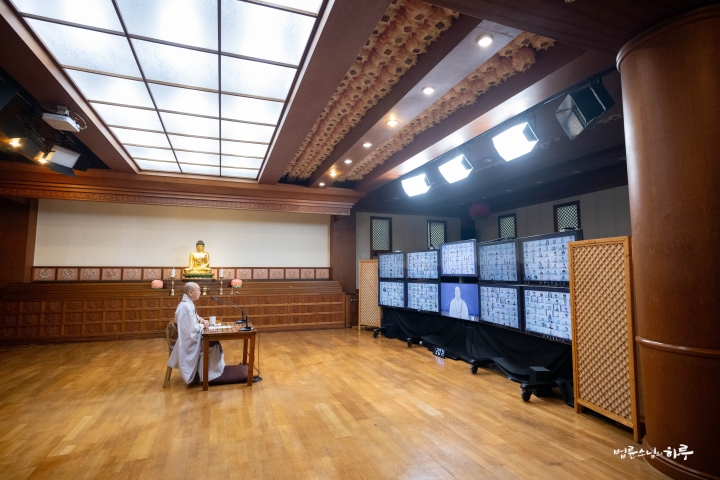
The assembly requested a closing Dharma talk from Sunim. Sunim shared what mindset the lead volunteers should maintain as they carry out their activities.
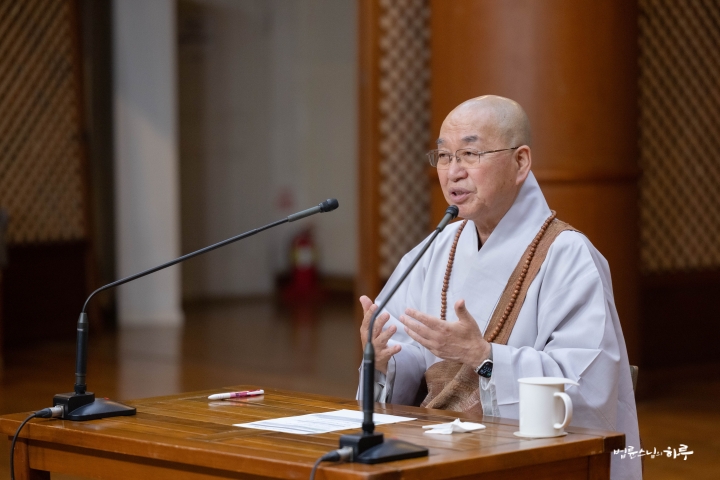
“During this 100-day period, we are engaged in special practice. We have decided to come together in hope for greater stability in our society and peace on the Korean Peninsula. As society becomes increasingly chaotic, each of us must sincerely pray for the peace of our nation from our respective positions. Beyond praying, spreading the Dharma, and creating good karma, we must encourage and persuade important figures in society to play more positive roles. Just moments ago, I met with a political leader to request and encourage a spirit of cooperative governance for stable national administration.
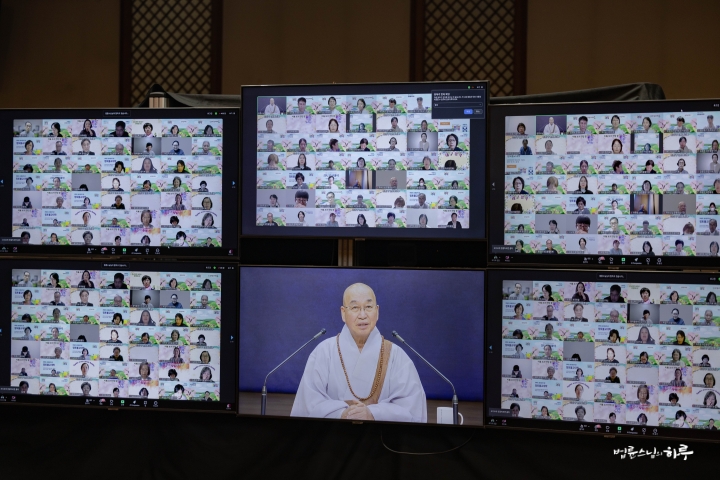
Holding Hope That Great Changes Will Occur After the 100 Days
Currently, during this period of the 100-Day Dharma Talk and special practice, the most important thing is for all of you to practice diligently every day. I believe that after these 100 days, a miracle regarding our aspirations will occur. In fact, it’s not really a miracle but the result of our efforts. However, when something unexpected happens, don’t we usually call it a miracle? Just as changes occurred at the end of last year after our June 13th Great Dharma Assembly of 10,000 People, I hope you will continue your diligent practice with faith and hope that significant changes will occur in our society by the end of this 100-day prayer period.
If you become attached to and caught up in trivial matters, developing discriminating thoughts, only you will suffer. This prevents your energy from flowing positively. I hope you can maintain an attitude of flexibility, letting go of small matters and looking at the bigger picture while practicing consistently. When you do this, each of us can become a piece of the Buddha, playing our role in the mosaic Buddha. I thank you for your activities over the past year and ask for your continued efforts in the coming year.”
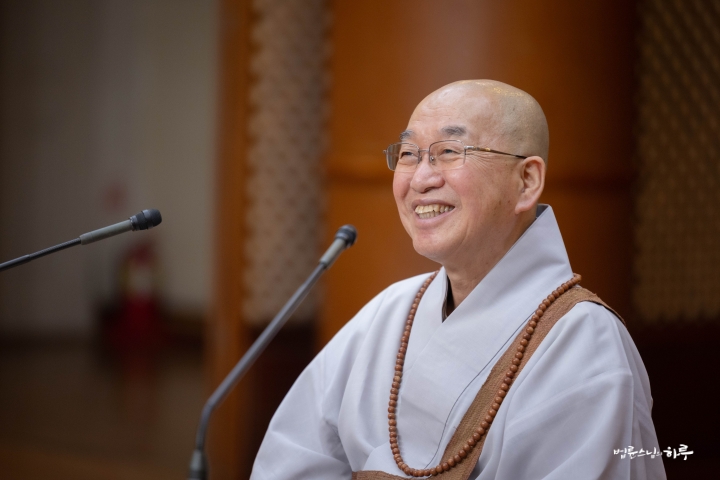
After reflecting on Sunim’s Dharma talk and reciting the Four Great Vows, the Leading Members’ Assembly came to a close.
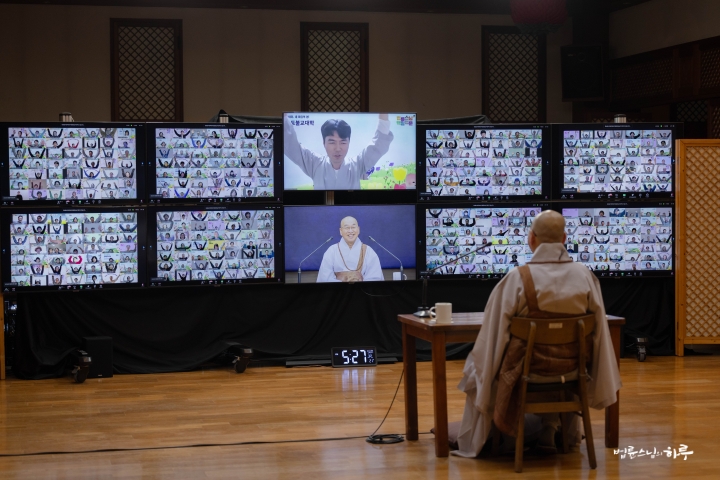
As the sun set, Sunim spent the evening indoors completing administrative work and proofreading manuscripts before concluding his day.
Tomorrow will be the 15th day of the 100-Day Dharma Talk. In the morning, Sunim will hold an Open Dharma Talk about the significance of memorial services. In the afternoon, he will meet with the Standing Committee members who are preparing for the next 1000-Day Practice. In the evening, he plans to conduct another Open Dharma Talk on the topic of ‘Song of Dharma Nature’.





merch = mercy..